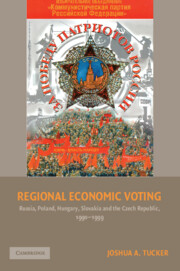Book contents
- Frontmatter
- Contents
- List of Tables
- Acknowledgments
- Party Acronyms and Candidate Abbreviations
- 1 INTRODUCTION
- 2 ECONOMIC CONDITIONS AND ELECTION RESULTS
- 3 COMPARATIVE CROSS-REGIONAL ANALYSIS
- 4 PAIRED CASE STUDIES
- 5 THE INCUMBENCY HYPOTHESIS
- 6 THE NEW REGIME HYPOTHESIS
- 7 THE OLD REGIME HYPOTHESIS
- 8 COMPARATIVE ANALYSIS
- 9 ECONOMIC VOTING AND POSTCOMMUNIST POLITICS
- Appendix I NATIONAL ELECTION RESULTS
- Appendix II REGRESSION RESULTS AND DOCUMENTATION
- Appendix III ESTIMATED DISTRIBUTIONS OF FIRST DIFFERENCES
- Appendix IV PERCENTAGE OF POSITIVE SIMULATIONS BY PARTY
- Works Cited
- Index
- Titles in the series
1 - INTRODUCTION
Published online by Cambridge University Press: 24 November 2009
- Frontmatter
- Contents
- List of Tables
- Acknowledgments
- Party Acronyms and Candidate Abbreviations
- 1 INTRODUCTION
- 2 ECONOMIC CONDITIONS AND ELECTION RESULTS
- 3 COMPARATIVE CROSS-REGIONAL ANALYSIS
- 4 PAIRED CASE STUDIES
- 5 THE INCUMBENCY HYPOTHESIS
- 6 THE NEW REGIME HYPOTHESIS
- 7 THE OLD REGIME HYPOTHESIS
- 8 COMPARATIVE ANALYSIS
- 9 ECONOMIC VOTING AND POSTCOMMUNIST POLITICS
- Appendix I NATIONAL ELECTION RESULTS
- Appendix II REGRESSION RESULTS AND DOCUMENTATION
- Appendix III ESTIMATED DISTRIBUTIONS OF FIRST DIFFERENCES
- Appendix IV PERCENTAGE OF POSITIVE SIMULATIONS BY PARTY
- Works Cited
- Index
- Titles in the series
Summary
The story of postcommunism is, to a large extent, the story of simultaneous transitions. The speed at which so many countries fundamentally and simultaneously reorganized both their political and economic systems may be unprecedented in human history. To understand the postcommunist experience, therefore, one must understand the interaction between these two different and yet interconnected processes. A great deal of academic energy has been expended in an effort to understand how political factors have affected economic developments in the postcommunist world. Less attention, however, has been paid to systematic studies of the manner in which economic conditions have reverberated back into the political process.
One fundamental way in which economic developments affect political developments is through elections and voting. Political science has a rich literature on the topic of economic voting in established democracies but has only begun to scratch the surface of the topic in newer democracies. The politics of economic reform literature in particular often seems to sidestep the topic entirely, relying on conclusions generated from the economic voting literature in established democracies to assume that voters will turn against incumbent parties when faced with the economic pain that is an inevitable by-product of a transition to a more market oriented economy. The uncertainty paradigm, also applied in discussions of postcommunist transitions, takes this one step further by highlighting the many factors working against the likelihood of identifying any systematic effects on political behavior in the wake of the transition's complete and utter upheaval of citizens' political and economic worlds.
- Type
- Chapter
- Information
- Regional Economic VotingRussia, Poland, Hungary, Slovakia, and the Czech Republic, 1990–1999, pp. 1 - 26Publisher: Cambridge University PressPrint publication year: 2006
- 1
- Cited by



